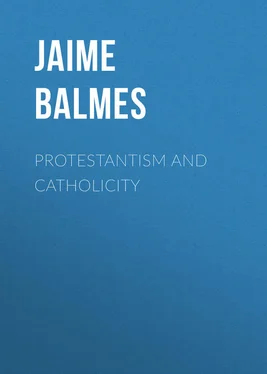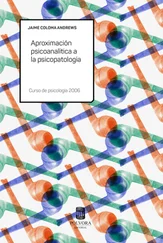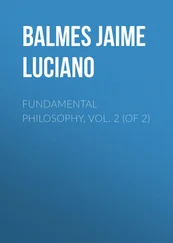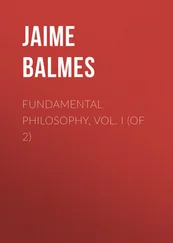Jaime Balmes - Protestantism and Catholicity
Здесь есть возможность читать онлайн «Jaime Balmes - Protestantism and Catholicity» — ознакомительный отрывок электронной книги совершенно бесплатно, а после прочтения отрывка купить полную версию. В некоторых случаях можно слушать аудио, скачать через торрент в формате fb2 и присутствует краткое содержание. Жанр: foreign_antique, foreign_prose, на английском языке. Описание произведения, (предисловие) а так же отзывы посетителей доступны на портале библиотеки ЛибКат.
- Название:Protestantism and Catholicity
- Автор:
- Жанр:
- Год:неизвестен
- ISBN:нет данных
- Рейтинг книги:3 / 5. Голосов: 1
-
Избранное:Добавить в избранное
- Отзывы:
-
Ваша оценка:
- 60
- 1
- 2
- 3
- 4
- 5
Protestantism and Catholicity: краткое содержание, описание и аннотация
Предлагаем к чтению аннотацию, описание, краткое содержание или предисловие (зависит от того, что написал сам автор книги «Protestantism and Catholicity»). Если вы не нашли необходимую информацию о книге — напишите в комментариях, мы постараемся отыскать её.
Protestantism and Catholicity — читать онлайн ознакомительный отрывок
Ниже представлен текст книги, разбитый по страницам. Система сохранения места последней прочитанной страницы, позволяет с удобством читать онлайн бесплатно книгу «Protestantism and Catholicity», без необходимости каждый раз заново искать на чём Вы остановились. Поставьте закладку, и сможете в любой момент перейти на страницу, на которой закончили чтение.
Интервал:
Закладка:
The soul is overwhelmed with painful apprehensions at the thought that a day may come when religious unity will be banished from among us; that unity which is identified with our habits, our customs, our manners, our laws; which guarded the cradle of our monarchy in the cavern of Covadonga, and which was the emblem on our standard during a struggle of eight centuries against the formidable crescent; that unity which developed and illustrated our civilization in times of the greatest difficulty; that unity which followed our terrible tercios , when they imposed silence upon Europe; which led our sailors when they discovered the new world, and guided them when they for the first time made the circuit of the globe; that unity which sustains our soldiers in their most heroic exploits, and which, at a recent period, gave the climax to their many glorious deeds in the downfall of Napoleon. You who condemn so rashly the work of ages; you who offer so many insults to the Spanish nation, and who treat as barbarism and ignorance the regulating principle of our civilization, do you know what it is you insult? Do you know what inspired the genius of Gonzalva, of Ferdinando Cortez, of the conqueror of Lepanto? Do not the shades of Garcilazo, of Herrara, of Ercilla, of Fray Luis de Leon, of Cervantes, of Lope de Vega, inspire you with any respect? Can you venture to break the tie which connects us with them, to make us the unworthy posterity of these great men? Do you wish to place an impassable barrier between their faith and ours, between their manners and ours, to make us destroy all our traditions, and to forget our most inspiring recollections? Do you wish to preserve the great and august monuments of our ancestors' piety among us only as a severe and eloquent reproach? Will you consent to see dried up the most abundant fountains to which we can have recourse to revive literature, to strengthen science, to reorganize legislation, to re-establish the spirit of nationality, to restore our glory, and replace this nation in the high position which her virtues merit, by restoring to her the peace and happiness which she seeks with so much anxiety, and which her heart requires?
CHAPTER XIII.
CATHOLICITY AND PROTESTANTISM IN RELATION TO SOCIAL PROGRESS. PRELIMINARY COUP D'ŒIL
After having placed Catholicity and Protestantism in contrast, in a religious point of view, in the picture which I have just drawn; after having shown the superiority of the one over the other, not only in certainty, but also in all that regards the instincts, the feelings, the ideas, the characteristics of the human mind, it seems to me proper to approach another question, certainly not less important, but much less understood, and in the examination of which we shall have to contend against strong antipathies, and to dissipate many prejudices and errors. Amid the difficulties by which the question that I am about to undertake is surrounded, I am supported by a strong hope that the interest of the subject, and its analogy with the scientific taste of the age, will invite a perusal; and that I shall thereby avoid the danger which commonly threatens those who write in favor of the Catholic religion, that of being judged without being heard. The question may be stated thus: "When we compare Catholicity and Protestantism, which do we find the most favorable to real liberty, to the real progress of nations, to the cause of civilization?" Liberty! This is one of those words which are as generally employed as they are little understood; words which, because they contain a certain vague idea, easily perceived, present the deceptive appearance of perfect clearness, while, on account of the multitude and variety of objects to which they apply, they are susceptible of a variety of meanings, and, consequently, are extremely difficult to comprehend. Who can reckon the number of applications made of the word liberty? There is always found in this word a certain radical idea, but the modifications and graduations to which the idea is subject are infinite. The air circulates with liberty; we move the soil around the plant, to enable it to grow and increase with liberty; we clean out the bed of a stream to allow it to flow with liberty; when we set free a fish in a net, or a bird in a cage, we give them their liberty; we treat a friend with freedom; we have free methods, free thoughts, free expressions, free successions, free will, free actions; a prisoner has no liberty; nor have boys, girls, or married people; a man behaves with greater freedom in a foreign country; soldiers are not free; there are men free from conscription, from contributions; we have free votes, free acknowledgments, free interpretation, free evidence; freedom of commerce, of instruction, of the press, of conscience; civil freedom, and political freedom; we have freedom just, unjust, rational, irrational, moderate, excessive, limited, licentious, seasonable, unseasonable. But I need not pursue the endless enumeration. It seemed to me necessary to dwell upon it for a moment, even at the risk of fatiguing the reader; perhaps the remembrance of all this may serve to engrave deeply on our minds the truth, that when, in conversation, in writing, in public discussions, in laws, this word is so frequently employed as applied to objects of the highest importance, it is necessary to consider maturely the number and nature of the ideas which it embraces in the particular case, the meaning that the subject needs, the modifications which the circumstances require, and the precaution demanded in the case.
Whatever may be the acceptation in which the word liberty is taken, it is apparent that it always implies the absence of a cause restraining the exercise of a power. Hence it follows that, in order to fix in each case the real meaning of the word, it is indispensable to pay attention to the circumstances as well as to the nature of the power, the exercise of which is to be prevented or limited, without losing sight of the various objects to which it applies, the conditions of its exercise, as also the character, power, and extent of the means which are employed to restrain it. To explain this matter, let it be proposed to form a judgment on the proposition, "Man ought to enjoy liberty of thought."
It is here affirmed that freedom of thought in man ought not to be restrained; but do you speak of physical force exercised directly on thought itself? In that case the proposition is entirely vain; for as such an application of force is impossible, it is useless to say that it ought not to be employed. Do you mean to say that it is not allowable to restrain the expression of thought; that is to say, that the liberty of manifesting thought ought not to be hindered or restrained? You have, then, made a great step, you have placed the question on a different footing. Or if you do not mean to say that every man, at all times, in all places, and on all subjects, has a right to give utterance to all that comes into his head, and that in any way he may think proper, you must then specify the things, the persons, the places, the times, the subjects, the conditions; in short, you must note a variety of circumstances, you must prohibit altogether in some cases, limit in others, bind in some, loosen in others; in fine, make so many restrictions, that you will make little progress in establishing your general principle of freedom of thought, which at first appeared so simple and so clear. Even in the sanctuary of thought, where human sight does not extend, and which is open to the eye of God alone, what means the liberty of thought? Is it owing to chance that laws are imposed on thought to which it is obliged to submit under pain of losing itself in chaos? Can it despise the rules of sound reason? Can it refuse to listen to the counsels of good sense? Can it forget that its object is truth? Can it disregard the eternal principles of morality? Thus we find, in examining the meaning of the word liberty, even as applied to what is certainly freer than any thing else in man, viz. thought – we find such a number and variety of meanings that we are forced to make many distinctions, and necessity compels us to limit the general proposition, if we wish to avoid saying any thing in opposition to the dictates of reason and good sense, the eternal laws of morality, the interests of individuals, and the peace and preservation of society. And what may not be said of so many claims of liberty which are constantly propounded in language intentionally vague and equivocal?
Читать дальшеИнтервал:
Закладка:
Похожие книги на «Protestantism and Catholicity»
Представляем Вашему вниманию похожие книги на «Protestantism and Catholicity» списком для выбора. Мы отобрали схожую по названию и смыслу литературу в надежде предоставить читателям больше вариантов отыскать новые, интересные, ещё непрочитанные произведения.
Обсуждение, отзывы о книге «Protestantism and Catholicity» и просто собственные мнения читателей. Оставьте ваши комментарии, напишите, что Вы думаете о произведении, его смысле или главных героях. Укажите что конкретно понравилось, а что нет, и почему Вы так считаете.












